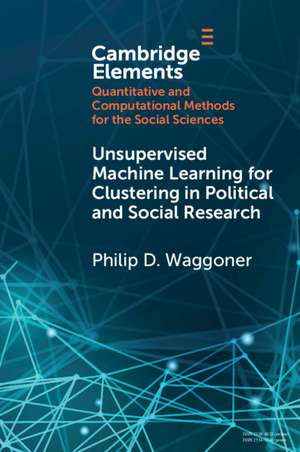Unsupervised Machine Learning for Clustering in Political and Social Research: Elements in Quantitative and Computational Methods for the Social Sciences
Autor Philip D. Waggoneren Limba Engleză Paperback – 27 ian 2021
Din seria Elements in Quantitative and Computational Methods for the Social Sciences
-
 Preț: 137.84 lei
Preț: 137.84 lei -
 Preț: 129.40 lei
Preț: 129.40 lei -
 Preț: 129.79 lei
Preț: 129.79 lei -
 Preț: 129.92 lei
Preț: 129.92 lei -
 Preț: 144.89 lei
Preț: 144.89 lei -
 Preț: 146.09 lei
Preț: 146.09 lei -
 Preț: 143.76 lei
Preț: 143.76 lei -
 Preț: 143.38 lei
Preț: 143.38 lei -
 Preț: 143.97 lei
Preț: 143.97 lei - 20%
 Preț: 124.71 lei
Preț: 124.71 lei -
 Preț: 129.70 lei
Preț: 129.70 lei -
 Preț: 143.97 lei
Preț: 143.97 lei -
 Preț: 144.14 lei
Preț: 144.14 lei -
 Preț: 143.16 lei
Preț: 143.16 lei
Preț: 129.21 lei
Nou
Puncte Express: 194
Preț estimativ în valută:
24.73€ • 25.90$ • 20.49£
24.73€ • 25.90$ • 20.49£
Carte disponibilă
Livrare economică 18 martie-01 aprilie
Livrare express 04-08 martie pentru 13.99 lei
Preluare comenzi: 021 569.72.76
Specificații
ISBN-13: 9781108793384
ISBN-10: 110879338X
Pagini: 75
Dimensiuni: 230 x 150 x 5 mm
Greutate: 0.1 kg
Editura: Cambridge University Press
Colecția Cambridge University Press
Seria Elements in Quantitative and Computational Methods for the Social Sciences
Locul publicării:New York, United States
ISBN-10: 110879338X
Pagini: 75
Dimensiuni: 230 x 150 x 5 mm
Greutate: 0.1 kg
Editura: Cambridge University Press
Colecția Cambridge University Press
Seria Elements in Quantitative and Computational Methods for the Social Sciences
Locul publicării:New York, United States
Cuprins
1. Introduction; 2. Setting the stage for clustering; 3. Agglomerative hierarchical clustering; 4. k-means clustering; 5. Gaussian mixture models; 6. Advanced methods; 7. Conclusion.
Descriere
Offers researchers and teachers an introduction to clustering, with R code and real data to facilitate interaction with the concepts.
